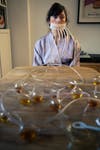Billed as “a unique collaboration between science and design,” IMPACT! – an exhibition that recently wrapped at the Royal College of Art in Kensington, UK – explored the many ways physical sciences and engineering overlap to leave their marks on our ecnomies, our policies, and our everyday lives.
Launch the gallery above for some of our favorite projects.
The mixed-media exhibit brought together a collection of original design proposals aimed at pushing this connection between science and society forward. The results, as you will see, were pretty impressive, ranging from the practical to the whimsical to the metaphorical.
But perhaps the adjective that best ties all the pieces together is revolutionary, as each piece boldly imagines a new way to look at existing technology, or a new technology that pushes forward existing science, making for a very interesting mash up of future tech, science and outside-the-paradigm thinking.
[IMPACT! via Core77]
Happylife
“Security is increasingly concerning people in their day-to-day lives and we are looking to technology to try and protect us. What if a machine could read people’s emotions more effectively than people could? James Auger has tried to gain an understanding of how living with this kind of technology would affect our relationships with one another. ‘What would it mean to introduce such technology into the family home: when an electronic device can know more about your partner’s state than you do? Or can predict an oncoming bout of misery through statistical analysis of accumulated data.'” [via Arts Thread]
Phantom Recorder
“When a limb is lost, the mind often develops a phantom sensation. The phantom owner is suddenly endowed with a unique and personal appendage, invisible to others and sometimes capable of extraordinary hyperabilities. As strategies for repair focus on practical solutions, they tend to overlook poetic functions of our body, but what if one could record and keep their phantom sensation, to be awoken on request?”
5th Dimensional Camera
“At a molecular level the world is very different from the way we experience it. The weird ‘quantum’ nature of this molecular world has captivated scientists for several decades, and now they are attempting to build a machine – a ‘quantum computer’ – that will harness this atomic strangeness to perform tasks practically impossible with conventional technology. But beyond the computational possibilities lie more pertinent questions: What does quantum computing tell us about the underlying nature of the universe? Are we inhabiting just one of an infinite number of parallel worlds? And if so, what does that say about our place in existence?”
Synthetic Immune System
“Synthetic Biology’s potential to make healthcare more personal and participatory might turn us into our own doctors and pharmacists; constantly monitoring and tweaking our body. It might even allow to externalise our immune system by outsourcing metabolic processes to external micro-organisms. These micro-organisms, for instance yeasts, sense and diagnose anomalies in our body to produce and deliver chemicals accordingly. Such a Synthetic Immune System would be tailored to one’s genetic predisposition, age, lifestyle and therefore risk.”
Fabulous Fabbers
“Advances in micro-scale engineering point to a global scale revolution where local, disposable factories produce hi tech goods at our very doorstep. What shapes might this new way of “making things” take within our urban landscape ? From garage-workshops to circus-like temporary structures, from street vendor stalls to vagabond encampments, this project explores the factories of the future and what our relationship to them might be, with the exciting prospect of taking back ownership over our production tools.”
Pathogen Hunter
“Pathogen Hunter project explores how disease monitoring might change our health etiquette. Surveillance personnel – Pathogen Hunters – would be specially trained with very particular tools to manage infectious outbreaks. But no matter how clean we are or how healthy we feel, we still carry billions of microbes on our bodies. Will we change our behaviour by preventing the spread of pathogens to others? What will be the consequences for our social conventions?”
!["Security is increasingly concerning people in their day-to-day lives and we are looking to technology to try and protect us. What if a machine could read people's emotions more effectively than people could? James Auger has tried to gain an understanding of how living with this kind of technology would affect our relationships with one another. 'What would it mean to introduce such technology into the family home: when an electronic device can know more about your partner's state than you do? Or can predict an oncoming bout of misery through statistical analysis of accumulated data.'" [via <a href="http://blog.artsthread.com/?p=2760">Arts Thread</a>]](https://www.popsci.com/uploads/2019/03/18/JUOCXST3UEK62MR6WLTGKUTLKE.jpg?auto=webp&optimize=high&width=100)




